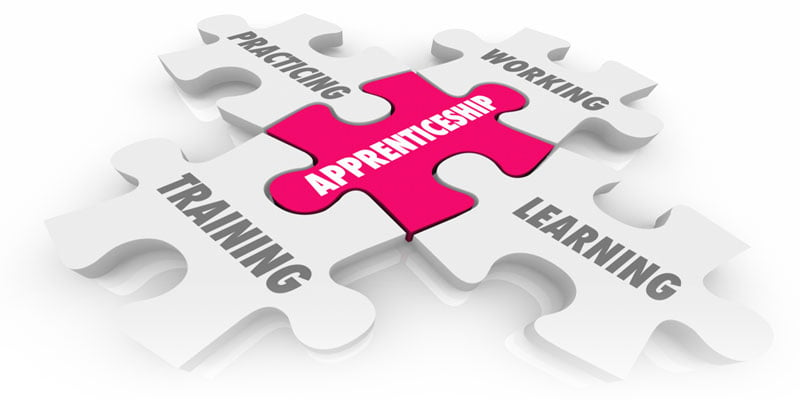News & Blog
Apprenticeships – Practical Learning and Development
In preparation for National Apprenticeship Week, we asked a few of our instructors what they thought about apprenticeships. There can be some uncertainties when it comes to choosing what path to take especially when it can affect your future, so we thought what better way to find out than from the teachers and trainers themselves!
This is what Sue Hopgood, our senior lecturer in project management had to say:
Apprenticeships make so much sense. It's really a 'win-win-win-win' situation!
The apprentice wins by getting more skills, qualifications and confidence. The employer wins twice. Firstly by using funds that they were required to put into their apprenticeship service account anyway to improve the skill levels in their workforce. Secondly, this should lead to higher productivity and revenue for the employer.
The government wins by having more people in employment, plus higher tax revenue from companies that are benefiting from more productive staff. Lastly, the training company gains by delivering more training. Competition in this market place has driven training companies to innovate and improve their apprenticeship offerings, leading to an increase in training excellence."
Sue continues to describe the benefits from an apprentice's point of view.
An apprenticeship is an ideal opportunity to learn new skills while being paid. It's the obvious choice for those of us who are active learners or those of us who want the opportunity to apply what we've learnt immediately, rather than waiting until the end of a full time course. This is particularly relevant if your chosen profession is changing rapidly due to technological advancements. For some though, the biggest draw is that you get some practical work experience on your CV as soon as possible, making it easier to get the job you really want in the future.
When I was teaching at a sixth form college there seemed to be a drive to push students on to full time higher education. It made the school/college look good to brag to parents of future students at Open Evenings that '87% of our students go on to university'. To be honest, I'd be more impressed if these schools and colleges could brag about the high percentage of students that went into an apprenticeship. That would show me that they were less worried about their figures and more invested in doing their best for individual students."

Dave Owen, our Programme Area Leader in Engineering spoke about his views on the plumbing apprenticeship that he teaches here at MKC Training:
The plumbing apprenticeship is a fabulous way to learn and become qualified in what is a great trade! This apprenticeship equips trainees with the skills they need to fulfil their role in the Army, the Royal Engineers, and also if they leave and become a civilian.
The apprenticeship appeals to many learners as it's a fantastic way to gain a qualification without going through an academic route. It also stands them in good stead with their counterparts in civilian life.
The on the job training they receive is second to none and gives them the skills and confidence to do plumbing jobs easily."
Ian Hobbs, our Faculty Manager in Engineering Services speaks about the heating, plumbing and fabrication apprenticeship that he teaches here at the Barracks:
The modern apprenticeships are a great way to fill what was an ever widening skills gap in the practical spectrum of trades. The apprenticeships in Heating and Plumbing and Fabrication that we offer the students in the Engineering Services Faculty will give them the bedrock of a great career in Engineering.
The programme of real work experience combines with a sound theory-based syllabus, and finishes with a well-structured end point assessment (EPA) to give a clear standardised baseline for all students to progress in their chosen fields and grow within their trades and professions. Students gain confidence and experience as they move through their apprenticeship programme, giving them a great gateway to an exciting future."
What about from a learner's perspective?
Our Quality Systems Coordinator, Richard Ingram is a current apprentice studying for his MBA Apprenticeship. We asked him how he was getting on and what his personal experience has been so far:
I'm just over halfway through my 2½ year Senior Leader Master's Degree Apprenticeship (SLMDA) with The Open University. The combination of academic study and work-based activities provides a wide range of new knowledge and skills. For example, year one developed my understanding of individual and team motivation, change management, stakeholder analysis, finance, marketing and operations. My current strategy module comes at an interesting time as the business looks to develop and grow – lots of potential work-based examples!
Whilst it certainly hasn't been easy, (20,000 words and counting, 20+ hours per week, 3 hour exams) all sandwiched between work and home life, it has been very enjoyable and inspiring. Particular highlights have been 4-day residential schools and collaborative tasks using conferencing technology. The support of colleagues and off-the-job study time are essential to maintain study momentum. The next few months begin the process of MBA project planning and Apprenticeship End Point Assessment showcase development."
Why not ask us about MKC Training's approach to setting up apprenticeship programmes? This could be a valuable way forward for you and your organisation.
Apprenticeships make so much sense. It's really a 'win-win-win-win' situation!
Discover our other posts by category:
- Apprenticeships (3 posts)
- Armed Forces (7 posts)
- Company News (21 posts)
- Construction (8 posts)
- Courses (12 posts)
- Covid-19 (4 posts)
- Cyber and IT (4 posts)
- eLearning (6 posts)
- Engineering (2 posts)
- Events (4 posts)
- Exams (3 posts)
- Gamification (4 posts)
- Gas (1 post)
- Health and Safety (6 posts)
- ITIL (10 posts)
- Project
Management (22 posts) - Scaffolding (2 posts)
- Technology (13 posts)
- Training Strategy (8 posts)